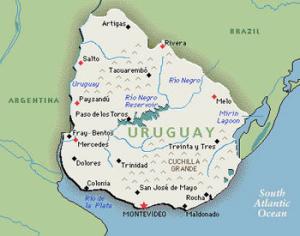Uruguay issues rules for legal marijuana growing and sales, the Argentines attack US drug policy, a new London School of Economics report trashes the drug war as a failure, the DEA orders a massive increase in marijuana for research purposes, a Minnesota medical marijuana bill is moving, and more. Let's get to it:

DEA Orders Massive Increase in Marijuana Production for Research Purposes. They're going to be busy this year at the US government's pot farm in Mississippi. The DEA announced Monday that it has dramatically increased the amount of marijuana to be grown for research purposes. The DEA had originally set the quota at 21 kilograms of marijuana, but has now increased that amount 30-fold, to 650 kilograms. The DEA acted at the behest of the National Institutes on Drug Abuse (NIDA), which says the increase is needed "to provide for current and anticipated research involving marijuana."
Medical Marijuana
Minnesota Medical Marijuana Bill Heads for Senate Floor Vote. A proposal to legalize medical marijuana in Minnesota is headed for a vote by the full state Senate. Senate File 1641 passed out of the Senate Finance Committee Monday. It would authorize up to 55 dispensaries and provide access to marijuana for patients with specified medical conditions, including HIV/AIDS, cancer, glaucoma, epilepsy, PTSD, and several conditions that cause chronic pain. Patients would not be allowed to smoke marijuana, but could vape it. A more restrictive bill is moving in the House.
Iowa Governor Unsure About Signing CBD Medical Marijuana Bill. Gov. Terry Branstad (R) said Monday he's unsure if he'll sign a CBD medical marijuana bill that has passed the legislature. He said he hadn't read the Senate File 2360 yet and noted that he has 30 days to take action. "This is not something that's been approved by the [Food and Drug Administration,]" Branstad said in response to questions from reporters during his weekly news conference.
International
Uruguay Releases Regulations for Legal Marijuana Commerce. Today, Uruguay's new marijuana commerce regulations (link is in Spanish) go into effect. The government will now embark on the implementation of the legal marijuana market, which is expected to be up and running by the end of 2014. The regulations for medical marijuana are to be released later this summer. Under the new regs, Uruguayans 18 and older can grow their own (up to six plants), grow as part of a club or collective (up to 45 members and 99 plants), or buy up to 10 grams of marijuana a week at a licensed pharmacy. Marijuana consumers will have to register with the government for one of the three options. The registry data will be confidential and protected. All forms of advertising and promotion of use are prohibited, as is smoking in closed, public spaces, in the workplace, and at health establishments, schools and sports institutions. Driving under the influence of marijuana is not allowed, and the newly created Institute for Regulation and Control of Cannabis (IRCCA), tasked with regulating and controlling the whole system, will set the THC limits and types of test performed for DUI. Consumption at or during work is also prohibited. The price will vary, but will start at roughly $1 a gram.
Argentine Cabinet Chief Blasts US Drug Policy. Argentine Cabinet Chief Jorge Capitanich has joined Security Secretary Sergio Berni in harshly criticizing US drug policies. The attacks come in the wake of a US State Department report saying there was a "dramatic" increase in drug consumption there. Over the weekend, Berni rejected the report as "arbitrary" and said the US "imports drugs and exports death." Those statements were "clear, eloquent, and convincing," Capitanich said Monday. "Some countries are intent to teach lessons on drug policy when they should be taking a closer look at what happens in their own countries," he added.
London School of Economics Report Calls for New Approaches to Failed Drug War. A report from the London School of Economics released Monday night outlines the enormous negative outcomes and collateral damage from the war on drugs and calls for new, evidence-based approaches to drug use and the drug trade. The report, Ending the Drug Wars: Report of the LSE Expert Group on the Economics of Drug Policy, has chapters authored by leading drug policy experts from around the world and has been signed onto by five Nobel Prize-winning economists, as well as political figures including British Deputy Prime Minister Nick Clegg, Guatemalan Foreign Minister Luis Fernando Carrera Castro, former Polish President Aleksander Kwasniewski, former US Secretary of State George Schultz, and former European Union High Representative for Common Foreign and Security Policy Dr. Javier Solana, among other luminaries. There's lots of good reading in it; click the link to access it.
European Drug Monitoring Agency to Release Annual Report Later This Month. The European Monitoring Center on Drugs and Drug Abuse (EMCDDA) will present its annual overview of the European drug situation on May 27. Click on the link for more details.
This work by StoptheDrugWar.org is licensed under Creative Commons Attribution-ShareAlike 4.0 International
Add new comment